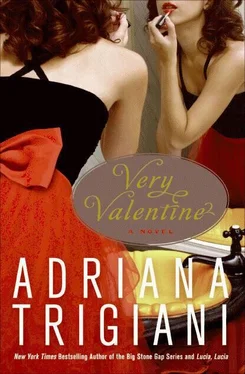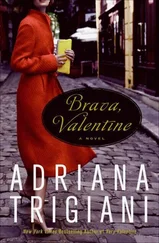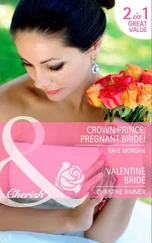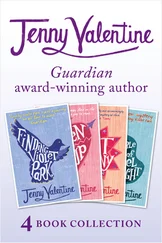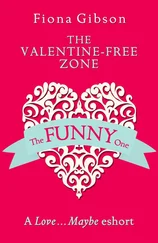I shake my head that I don’t.
“When you build a heel, test it. If it rocks evenly and stops, like this”-he drops the other shoe onto the table; it sways and stops in the same fashion as the first shoe-“you have built the shoe properly. If it falls over, you must rework the heel to achieve proper balance.”
“I will,” I promise him. “Costanzo, we name our shoes at Angelini’s. The truth is, I’m not an opera buff. But I am a woman who loves a good story. So, if you don’t mind, I’d like to call this shoe the Bella Rosa in honor of your wife. That is, if you don’t mind.”
Costanzo gets tears in his eyes; they cloud over the blue, just like the mist on the sea at nightfall. He nods that I may name this shoe after his wife. I have his permission. It’s so simple really. True love is without whim. It’s hardware. Durable. Everlasting. This world is where Costanzo and Rosa’s love happened, but eternity is where it lives. Love stays as long as someone remembers. I know their story and now I will tell it. I will think of Costanzo and Rosa every time I go to sketch, or cut a pattern, or sew a seam. He changed my point of view, so I will never forget him. I couldn’t.
I hold the shoes in my hands and remember the story of the shoemaker and the elves. The shoemaker and his wife were so poor, so beaten down by circumstance, that they left their last bit of leather out on their worktable, and so weary, they went to bed. The next morning, they found a perfect pair of shoes made from the leather. They put the shoes in the window and a customer bought them immediately. With that money, the shoemaker and his wife bought more leather, and night after night, they left out the supplies. And every morning, they returned to new shoes, made by the elves, more magnificent than before. It’s a story about when you’re most defeated, someone will come along and help, maybe even save you. This is what Costanzo did for me. And tomorrow, I must go home and do the same for the Angelini Shoe Company-the artist’s way.
The sun, the color of a ripe apricot, burns high in the sky over the pool of the Quisisana Hotel on my last day in Capri. The veranda and garden are filled with guests, sunning and swimming. I get out of the water and lie down on a chaise, and let the sun warm me through to my bones. This isn’t a bad way to turn thirty-four. It’s not what I had in mind, but I’m in the mood to embrace whatever life sends me. For example, instead of fighting the bathing suit my mother sent, I accessorized. I bought a pair of enormous silver hoop earrings studded with tiny white sapphires to wear with the suit. Now, the ensemble looks like it’s part of a plan. A gaudy, sparkling plan.
“Happy birthday,” Gianluca says as he sits on the chaise next to me.
I sit up. “Gram told you.”
“No, no, I looked at your passport when we stopped at security at the silk mill.”
“Why would you do that?”
“I wondered how old you were. I was happy you were thirty-three.”
“So was I. It just took turning thirty-four to appreciate thirty-three, if you know what I mean.”
“I do.” He gives me a look that says he’s been thinking about those kisses on my balcony as much as I have. The thrill and shame of it turn my cheeks red. He’ll think it’s the sun.
“What are your plans today?” he asks.
“You’re looking at them.”
“I’d like to celebrate your birthday with you,” he says.
I lean back on the chaise and pull my hat down over my eyes. “I’ve done enough celebrating with you.”
“You didn’t enjoy it?”
I push the brim of my hat off of my eyes. “Oh, I enjoyed it. But I shouldn’t have. I made it to my thirties without ever cheating on a boyfriend. Then you broke my streak.”
“How can you worry about a few kisses when he didn’t keep his word and join you here?”
An American woman on the next chaise, with a spray tan and wearing an orchid print swim dress, puts down her Jackie Collins paperback and commences to eavesdrop on our conversation.
“I know you Italians invented the vendetta, but I don’t believe in it. I won’t hurt Roman just because he disappointed me. I kissed you because I wanted to…and now,” I say loudly enough for the lady to hear, “I will have to kill you.”
Gianluca laughs.
I lean toward the nosy woman. “I’m a take-charge type,” I say to her.
“Let’s go,” he says.
I’m not big on surprises, so when Gianluca hustles me into a taxi in the piazza to go down to the pier, I’m pretty sure we’re going somewhere on Capri by boat. When I went on my tour of the island, I wasn’t observant about the politics of the dock. All I noticed were the lines of tourists waiting their turn to board the skiffs and experience the natural wonders of Capri. This time, we pass the hordes and I follow Gianluca around the pier to the end, where the local fishermen and families keep their boats. We get onboard a small white motorboat with a red leather interior.
“This is the exact color scheme of my dad’s 1965 Mustang,” I tell Gianluca. “He still has it.”
“This belongs to my cousin’s family.”
“You mean I didn’t have to cram in with the tourists to see the points of interest? I could have been on this little number?”
Gianluca starts the boat and maneuvers it out onto the open sea, past the tourists. As fast as he drives on land, he goes twice as fast on the ocean. He steers the boat out to where the water is smooth. We bounce over the waves effortlessly. This is the way to go, I think as we skip over the turquoise waves, drenched by a saltwater mist that cools us in the hot sun. Gianluca handles the boat with skill, but I keep my eyes on the water, and off him. There is much to admire about Gianluca Vechiarelli, but the last thing I need is another Italian man in my life.
We speed around the island until the back of the Quisisana comes into view. The entrance to the Blue Grotto is open. Satisfied that there is no one inside, Gianluca idles the boat near the entrance. He climbs out onto a ledge, and retrieves a sign that says NON ENTRATA IL GROTTO. He hangs the sign on an old nail over the entrance, then pulls a small rowboat from an alcove behind the ledge. He drops the rowboat into the water and reaches up for me.
“You have got to be kidding.” I point to the sign. “You mean it’s true?”
I step down into his arms and he lifts me into the rowboat.
“Stay low,” Gianluca instructs me. I duck my head as we enter the grotto. At first, all that I see is a gray cavern, the stone entrance, and then, as Gianluca rows, we enter the blue.
When I was a girl, I was obsessed with panorama Easter eggs, the kind made of white sugar shells decorated with swirls of colored icing. There was a window at the end of the candy egg, and when you held it up to look inside, a scene would be depicted. With one eye, I would study a field of swirly green icing for grass, a miniature princess in a tulle skirt sitting on a tiny mushroom flecked with sugar, a green candy frog resting near her feet, and bright blue jelly beans, placed around the scene like stones in a garden. I would look inside the egg for hours, imagining what it would be like to be inside. This is the same feeling I have inside the Blue Grotto.
It’s a wonderland of slick gray stones, walls worn away by the seawater, leading to a smooth lake of sapphire blue. Light pours in through holes in the rocks overhead, making silver funnels of light on the water. At the end of this cove, and deeper into the cavern, there’s a tunnel that leads beyond this lake, and through it, I see more light piercing between the rocks and reflecting on the water, creating a dimension of depth and a deeper blue.
“You can swim,” he says.
Читать дальше
